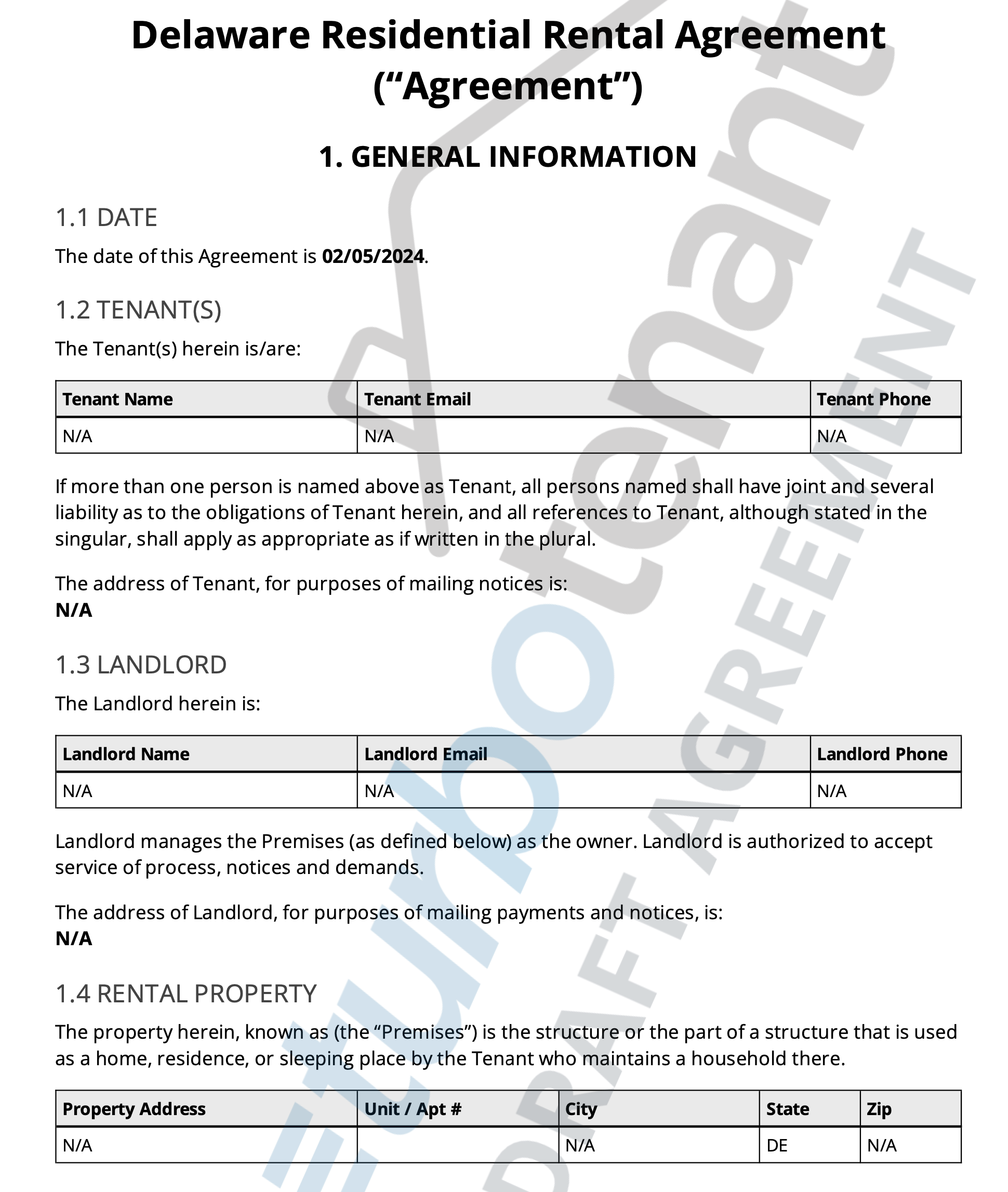
Delaware lease agreements are comprehensive contracts that outline the terms and conditions under which a rental property is leased by a landlord to a tenant. With the aid of TurboTenant’s Lease Agreement Generator and Templates, landlords in Delaware can seamlessly create a lease that is easy to understand for all parties involved, while also ensuring it adheres to the state’s particular legal requirements.
Custom Lease
The lease creation process begins with a personalized section where landlords can input the essential details of their rental arrangement. This includes identifying all parties involved, the amount of rent, utility responsibilities, and more. A summary table at the front of the lease agreement neatly organizes these main details for easy reference.
Personalization Highlights
- Additional Provisions: Landlords have the option to include property-specific rules or necessary local clauses, which should be reviewed by a lawyer.
- Lost Key Policy: Outlines the tenant’s obligation to return all keys and the potential costs associated with rekeying the property if they fail to do so.
Specific to Delaware
To ensure compliance with Delaware’s specific laws, Section 2 of the lease includes clauses that should only be edited after consultation with an attorney to make sure your changes do not bring your lease out of compliance with state and/or local laws. Our Advanced Editor feature allows changes to be made to these provisions, but again, we recommend consultation with an attorney. These clauses encompass critical aspects such as late fees, security deposit requirements, tenant absences, fair housing, and detector provisions.
Delaware-Specific Regulations
- Late Fees (Section 2.1): Rent is due on the specified due date, with a late fee of five percent (5%) charged if payment is not received by the fifth day of each month.
- Security Deposit Provisions (Section 2.4): In Delaware, security deposits cannot exceed one month’s rent, with the exception of month-to-month leases. The deposit must be kept in a separate FDIC-insured account, and landlords must disclose the account’s location to the tenant.
- Absences (Section 2.9): Tenants must notify the landlord in writing of any absence longer than seven days and arrange for the property to be checked during this time.
- Fair Housing (Section 2.10): All parties must comply with civil rights laws prohibiting housing discrimination.
- Smoke/Carbon Monoxide Detectors (Section 2.14): Tenants are responsible for maintaining the detectors and can be held liable for any damages or impairments to their functionality.
General Clauses for Best Practices
Section 3 contains standard clauses found in most lease agreements, reflecting best practices advised by experienced landlords.
General Clause Overviews
- Subletting (Section 3.1): Tenants are prohibited from subleasing without the landlord’s written consent.
- Altering or Improving the Property (Section 3.2): Tenants must obtain written consent from the landlord before making any alterations or improvements to the property.
- Military Personnel Clause/Family Violence/Sex Offenses or Stalking (Section 3.8): Acknowledges federal rights for lease termination by military personnel and victims of certain crimes under specific circumstances.
- Choice of Law (Section 3.11): The lease agreement is governed by Delaware laws, and any disputes must be resolved in the county courts where the property is located.
- Attorney/Collection Fees (Section 3.17): Tenants agree to pay all collection expenses incurred by the landlord to enforce the lease terms or collect financial losses.
- Indemnification (Section 3.20): Landlords are not liable for any injury or damage to tenants or their possessions, except as provided by law.

FAQ
What are the rules for late fees in Delaware lease agreements?
In Delaware, a late fee of five percent (5%) may be charged if rent is not received by the fifth day of each month, as stated in Section 2.1 of the lease agreement.
How should security deposits be managed in Delaware?
Security deposits in Delaware must not exceed one month’s rent, except for month-to-month leases, and must be held in a separate FDIC-insured account. Landlords are required to disclose the location of this account to the tenant, and the deposit must be returned within 20 days at the end of the lease, along with an itemized list of any deductions, as outlined in Section 2.4.
Is it necessary for tenants to notify landlords of extended absences?
Yes, tenants must notify landlords in writing if they anticipate being absent for more than seven days, as per Section 2.9. They must also arrange for the property to be checked during their absence.
How do the lease agreements address fair housing laws in Delaware?
All parties involved in the lease must act in accordance with federal and state laws that prohibit housing discrimination, as stated in Section 2.10.
TurboTenant Delaware
TurboTenant provides a comprehensive solution for Delaware landlords, offering a Lease Agreement Generator and Templates that simplify the lease creation process. These tools ensure that every lease agreement is tailored to the unique needs of the rental property while adhering to Delaware’s specific legal requirements. By incorporating essential elements such as late fees, security deposit guidelines, and fair housing laws, TurboTenant’s resources help landlords create enforceable and understandable contracts. Whether you’re managing a single property or multiple units, TurboTenant streamlines the leasing process, ensuring that both landlords and tenants can enter into their rental arrangements with confidence and clarity.
Delaware Resources

